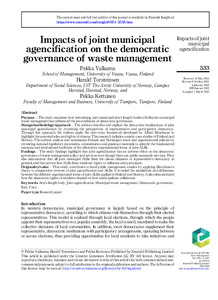Impacts of joint municipal agencification on the democratic governance of waste management
Valkama, Pekka; Torsteinsen, Harald; Kettunen, Pekka (2022-04-25)
Valkama, Pekka
Torsteinsen, Harald
Kettunen, Pekka
Emerald
25.04.2022
Julkaisun pysyvä osoite on
https://urn.fi/URN:NBN:fi-fe2023020726033
https://urn.fi/URN:NBN:fi-fe2023020726033
Kuvaus
vertaisarvioitu
© Pekka Valkama, Harald Torsteinsen and Pekka Kettunen. Published by Emerald Publishing Limited. This article is published under the Creative Commons Attribution (CC BY 4.0) licence. Anyone may reproduce, distribute, translate and create derivative works of this article (for both commercial and non-commercial purposes), subject to full attribution to the original publication and authors. The full terms of this licence may be seen at http://creativecommons.org/licences/by/4.0/legalcode
© Pekka Valkama, Harald Torsteinsen and Pekka Kettunen. Published by Emerald Publishing Limited. This article is published under the Creative Commons Attribution (CC BY 4.0) licence. Anyone may reproduce, distribute, translate and create derivative works of this article (for both commercial and non-commercial purposes), subject to full attribution to the original publication and authors. The full terms of this licence may be seen at http://creativecommons.org/licences/by/4.0/legalcode
Tiivistelmä
Purpose
The study examines how introducing joint municipal arm's length bodies (ALBs) into municipal waste management has influenced the preconditions of democratic governance.
Design/methodology/approach
The authors describe and explain the democratic implications of joint municipal agencification by reviewing the perspectives of representative and participative democracy. Through this approach, the authors apply the exit–voice framework developed by Albert Hirschman to highlight the potential roles and rights of citizens. This research includes country case studies of Finland and Norway. The authors analyse and systematize Finnish and Norwegian waste and organizational policies by reviewing national regulatory documents, commentaries and guidance materials to identify the fundamental missions and institutional traditions of the alternative organizational forms of joint ALBs.
Findings
The study findings highlight that joint agencification has an adverse effect on the democratic governance of waste management policy and services even though these are public monopoly services. They also demonstrate that all joint municipal ALBs limit the classic elements of representative democracy in general, and that private-law ALBs limit residents' rights to influence and participate.
Originality/value
This study contributes to local public management studies by applying Hirschman's theory to comparative reviews of joint agencification and ALBs. It revealed the similarities and differences between the different organizational forms of joint ALBs applied in Finland and Norway. It also demonstrated how the democratic rights of residents depend on how municipalities collaborate.
The study examines how introducing joint municipal arm's length bodies (ALBs) into municipal waste management has influenced the preconditions of democratic governance.
Design/methodology/approach
The authors describe and explain the democratic implications of joint municipal agencification by reviewing the perspectives of representative and participative democracy. Through this approach, the authors apply the exit–voice framework developed by Albert Hirschman to highlight the potential roles and rights of citizens. This research includes country case studies of Finland and Norway. The authors analyse and systematize Finnish and Norwegian waste and organizational policies by reviewing national regulatory documents, commentaries and guidance materials to identify the fundamental missions and institutional traditions of the alternative organizational forms of joint ALBs.
Findings
The study findings highlight that joint agencification has an adverse effect on the democratic governance of waste management policy and services even though these are public monopoly services. They also demonstrate that all joint municipal ALBs limit the classic elements of representative democracy in general, and that private-law ALBs limit residents' rights to influence and participate.
Originality/value
This study contributes to local public management studies by applying Hirschman's theory to comparative reviews of joint agencification and ALBs. It revealed the similarities and differences between the different organizational forms of joint ALBs applied in Finland and Norway. It also demonstrated how the democratic rights of residents depend on how municipalities collaborate.
Kokoelmat
- Artikkelit [2604]
